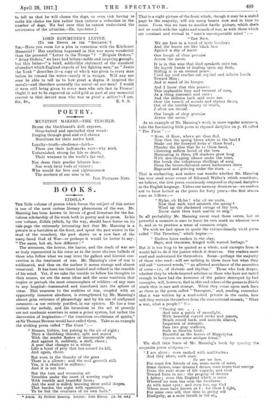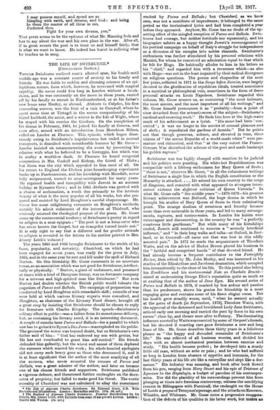BOOKS.
EIDOLA.• Tax little volume of poems which forms the subject of this notice is one of the most curious literary phenomena of the war. Mr. Manning has boon known to lovers of good literature for the fas- tidious scholarship of his work both in poetry and in prose. In his new volume, Eidola (which, by the way, should have borne on its title-page the extremely interesting fact that Mr. Manning is a private in a battalion at the front, and spent the past winter in the mud of the trenches), the poet shows us a new face of tho many-faced God of War—or perhaps it would be better to say: "The same, but ah, how different " The sternness, the horror, the havoc, and the crash of war are as truly represented in his verso as in the more obvious ballads of those who follow what we may term the gallant and historic con- vention in the treatment of war. Mr. Manning's view of war is sublimated, and thus on the surface it seems strange and almost unnatural. It has been ten times heated and refined in the crucible of his mind.. Yet, if we take the trouble to follow his thoughts to their source, we see the same ideas and the same emotions that inspire or perturb the most commonplace of soldiers—of any man in any hospital—transmuted and transfused into the sphere of verse. This nearness to the realities of war, coupled with an apparently immense aloofness, is strengthened by Mr. Manning's almost grim reticence of phraseology and by his use of unrhymed measures—a use entirely justified, in our opinion. Ho has a true instinct for melody, and his incursions in the art of prosody are not mechanic exercises in some a priori system, but rather the discoveries of inspiration—" the courteous revelations of spirits," as Sir Thomas Browne would have called them. Take as an example the striking poem called "The Guns" :— " Menace, bidden, but pulsing in the air of night: Then a throbbing thunder, split and seared With the scarlet flashes of innumerable shells, And against it, suddenly, a shell, closer ; A purr that changes to a whine Like a beast of prey that has missed its kill, And again, closer.
But even in the thunder of the guns There is a silence : and the soul groweth still. Yea, it is cloaked in stillness: And it is not fear.
But the torn and screaming air Trembles under the onset of warring angels With terrible and beautiful faces ; And the soul is stilled, knowing these awful shapes, That burden the night with oppression, To be but the creatures of its own lusts."
• Eidola. By Frederic Manning. London : John Murray-. (es. Gd. net.1
That is a night picture of the front which, though it may be a sealed page to the majority, will stir many hearts now and in time to come. From this we turn to another battle picture, which deals not so much with the sights and sounds of war, as with those which are constant and eternal in "man's unconquerable mind" :— "Tax Slam.
We are here in a wood of little beeches : And the leaves are like black lace Against a sky of nacre.
One bough of clear promise Across the moon.
It is in this wise that God speaketh unto me.
He layeth hands of healing upon my flesh, Stilling it in an eternal peace. Until my soul reaches out myriad and infinite hands Toward Him ; And is eased of its hunger.
And I know that this passes : This implacable fury and torment of men, As a thing insensate and vain : And the stillness bath said unto me, Over the tumult of sounds and shaken flame, Out of the terrible beauty of wrath, I alone ant eternal.
One bough of clear promise Across the moon."
As an example of Mr. Manning's work in more regular measures, take the fascinating little poem in rhymed dactylics on p. 43 called "The Faun" :— " Kore, 0 Kore, where art thou fled, Now that the spring blows white in the land ? Shako out the honeyed locks o' thine head; Plunder the lilies that lie to thine band, Glistering saffron loved of the bees Murmuring in them, till shadows grow long With dew-dropping silence under the trees, Ere break the voluptuous thrilling° of song From the brown-throated sweet harbourers there Raptured and grieving under the stars. . . ."
That is enchanting, and makes one wonder whether Mr. Manning has ever read some verses of Edmund Waller's which constitute, we believe, the first poem consciously composed in rhymed dactylics in the English language. Unless our memory deceives us—we confess not to have looked at the poem for forty year s—the first stanza runs as follows :— " Hylas, oh Hylas ! why it we mute, Now that each bird saluteth the spring ? Wind up the slackened strings of thy Into, Never eanst thou want matter to sing."
In all probability Mr. Manning never read these verses, but so powerful a measure is sure to leave its own mark on whoever uses it, and so to produce a sense of common origin.
We wish we had space to quote the extraordinarily vivid poem called " Tho Trenches," which begins :- " Endless lanes sunken in the clay, Bays, and traverses, fringed with wasted herbage."
But it is too long to be quoted as a whole, and excerpts from it would fail to do it the justice which it deserves. Our readers must read and understand for themselves. Some—perhaps the majority of those who read—will see nothing in these lines but what they will call "tortured words," "an affected avoidance of the amenities of verse—i.e., of rhetoric and rhythm." Those who look deeper, whether they be whole-hearted scholars or those who have not tasted enough to have had the keenness of the palate destroyed by bad examples, will, however, find in this and others of the poems in Eidolo much that is rare and strange. When they come upon such lines as these in the poem called "Transport," and, reading, remember that it was written by a mud-caked private in the ranks, how will they restrain themselves from the conventional remark, "What a war, what a people ! " 7— " Passing me. . .
And into a patch of moonlight, With beautiful curved necks and manes, Heads reined back, and nostrils dilated, Impatient of restraint, Pass two gray stallions, Such as Oenctia bred ; Beautiful as the horses of Hippolytus Carven on some antique frieze."
We shall take leave of Mr. Manning's book by quoting the exquisite poem ardpKaa:—
I am alone : even ranked with multitudes : And they alone, each man.
So are we free.
For some few friends of me, some earth of mine, Some shrines, some dreams I dream, some hopes that emerge From the rude stone of life vaguely, and tend Toward form in me : the progeny of dreams 1 father ; even this England which is :nine Whereof no man has seen the loveliness As with mine eyes : and even too, may God Whom none have known as I: for these I fight, For :nine own self, that thus in giving self Prodigally, as a mere breath in the air, I may pewees myself, and spend me so
Ningling with earth, and dreams, and God : and being In em the master of all these in me,
Perfected thus.
Fight for your own dreams, you."
That poem seems to be the epitome of what Mr. Manning feels and has to say about the war and his own place in the war. After all, if in great eventis the poet is to treat us and himself fairly, that is what we want to know. lie indeed has learnt in suffering what ho teaches us in song.



































 Previous page
Previous page